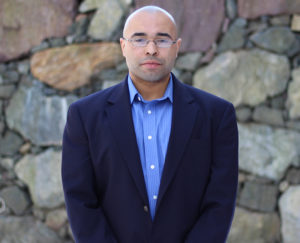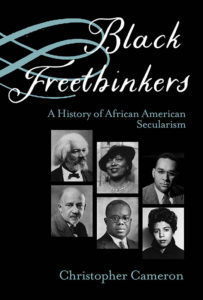From Slavery to Civil Rights: AHA Speaker Series Opens with History of Black Freethought

One of the best things about the American Humanist Association headquarters in Washington, DC—besides the sixteen-foot-tall happy humanist on its lovely blue exterior—is that it provides an excellent space to share social and educational events, like our AHA Speaker Series. Convened for the first time in 2018, the series welcomes inspiring speakers to our Dupont Circle home to discuss their area of expertise with local humanists. These events are free, open to the public, and include refreshments and time to connect and network after each talk.
The 2019-2020 season opens tonight with author Christopher Cameron educating us on “Black Freethought from Slavery to Civil Rights” and sharing his current book Black Freethinkers: A History of African American Secularism (copies available for purchase and signing). His talk will explore the religious skepticism abundant in African-American communities throughout US history, espoused by slaves and political and cultural figures alike who were unable to accept that a loving God would allow the kind of injustice they witnessed. Cameron will explain how central freethought—which includes atheism, agnosticism, deism, and paganism—was to the Harlem Renaissance (also referred to as the New Negro Renaissance), the growth of black socialism and communism, the Civil Rights Movement, and the Black Power Movement.
Cameron is an associate professor of history at the University of North Carolina at Charlotte and the founder and past president of the African American Intellectual History Society. He is also a member of the Black Nonbelievers of Charlotte and celebrates the work being done by individuals and organizations to strengthen the voices of black freethinkers in today’s society. His extensive research for Black Freethinkers included reviewing slave narratives, travel accounts, novels, poetry, memoirs, unpublished memoirs, newspapers, and archival sources such as church records, sermons, and letters. “While historians have used these sources to document various aspects of slave religiosity,” said Cameron, “they are also useful sources to document the presence of religious skepticism in southern slave communities.”
In a recent interview at the blog The Way of Improvement Leads Home, Cameron explained what led him to write Black Freethinkers.
Like countless scholars of African-American religion, I began this project after reading Al Raboteau’s classic book Slave Religion. Toward the end of the work, he mentions that not all slaves “took solace in religion” and some could not believe in a just and all-powerful God who would allow his people to suffer under slavery. Raboteau’s discussion of atheism and agnosticism occupies just two pages yet was incredibly intriguing to me, as I’d encountered no other historians who explored religious skepticism in nineteenth-century slave communities. This discovery led me to begin searching for examples of black freethinkers, both in the era of slavery and in the twentieth century, and what I found convinced me that black freethought was much more prevalent and important than scholars have realized.
 Leaders from across the humanist and secular movement will be reading Cameron’s book in preparation for the AHA Center for Education’s Master Class on “Intersectional Humanisms” to be held at our DC headquarters February 29 – March 1, 2020. Now in its third year, the Master Class was originally conceived by the late Carol Wintermute, former co-dean of The Humanist Institute, and established by her daughter Kristin Wintermute, who previously was the Institute’s executive director and is now the director of the AHA Center for Education. Previous classes (which are by-invitation to movement leaders) addressed humanism’s connection to anti-blackness and white nationalism. The 2020 session, taught by Dr. Monica R. Miller and Dr. Christopher Driscoll (who have both written online courses for the AHA Center for Education), will explore how to address the multiplicity of identities, motivations, and various kinds of marginalizations shaping humanists today.
Leaders from across the humanist and secular movement will be reading Cameron’s book in preparation for the AHA Center for Education’s Master Class on “Intersectional Humanisms” to be held at our DC headquarters February 29 – March 1, 2020. Now in its third year, the Master Class was originally conceived by the late Carol Wintermute, former co-dean of The Humanist Institute, and established by her daughter Kristin Wintermute, who previously was the Institute’s executive director and is now the director of the AHA Center for Education. Previous classes (which are by-invitation to movement leaders) addressed humanism’s connection to anti-blackness and white nationalism. The 2020 session, taught by Dr. Monica R. Miller and Dr. Christopher Driscoll (who have both written online courses for the AHA Center for Education), will explore how to address the multiplicity of identities, motivations, and various kinds of marginalizations shaping humanists today.
“I am really looking forward to this talk at the AHA headquarters and am honored to have my research included in further discussions on intersectionality,” says Cameron. If you’re local to the DC region, join us tonight, October 17, from 6:30-8:30pm for his exploration of black freethinkers throughout history. And consider attending other AHA Speaker Series events the next time you’re in DC. Each month is another opportunity to share space with humanists and learn about how we can together lead fulfilling, ethical lives.
